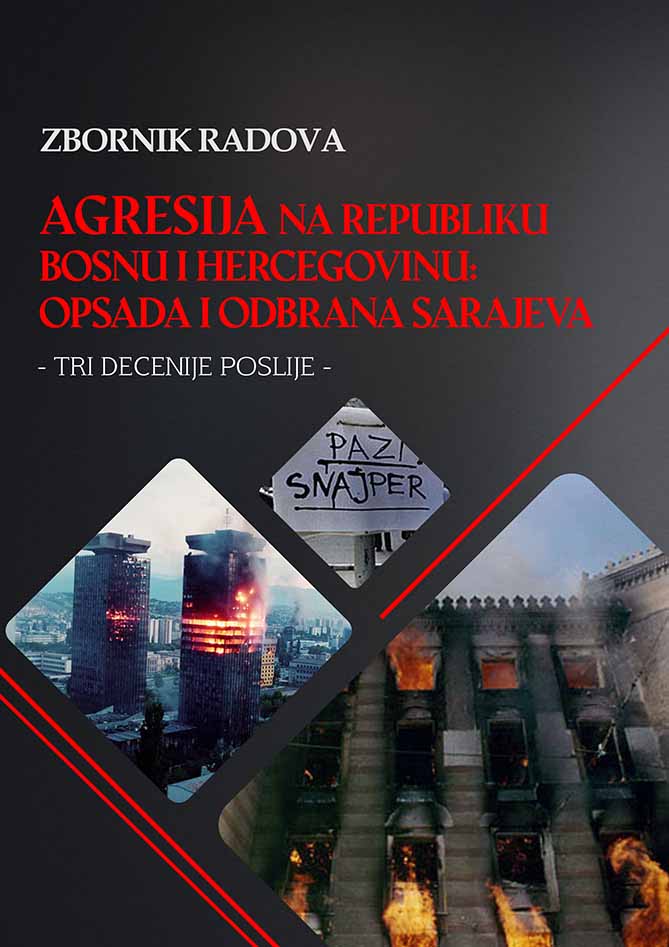ULOGA I ZNAČAJ PRVOG KORPUSA ARMIJE REPUBLIKE BOSNE I HERCEGOVINE U ODBRANI SARAJEVA
THE ROLE AND SIGNIFICANCE OF THE FIRST CORPS OF THE ARMY OF THE REPUBLIC OF BOSNIA AND HERZEGOVINA IN THE DEFENSE OF SARAJEVO
Author(s): Vahid Karavelić
Subject(s): Local History / Microhistory, Military history, Security and defense, Military policy, Studies in violence and power, Transformation Period (1990 - 2010), Peace and Conflict Studies
Published by: Institut za istraživanje zločina protiv čovječnosti i međunarodnog prava Univerziteta u Sarajevu
Keywords: Bosnia and Herzegovina, Sarajevo; 1st Corps of the Army of the Republic of Bosnia and Herzegovina; Igman; Tunnel D‒B (Tunnel of salvation); aggressor; Republika Srpska Army; Sarajevo-Romanija Corps;
Summary/Abstract: Sarajevo, as the capital of Bosnia and Herzegovina is the biggest urban, demographic, economic, and political centre, and the city which during the siege and defence had around 350,000 residents. The 1st Corps of the Army of the Republic of Bosnia and Herzegovina was growing from the ashes, and its predecessors were Patriotic league and Territorial defence which with the state insignia became legal and legitimate force of the Republic of Bosnia and Herzegovina Government. In the period March-April 1992, the aggressors managed to achieve a deep operational military blockade and placed the city under the siege. The city was militarily and hermetically closed. With this closure of the city, the aggressor manged to create all preconditions to begin with an open military operation aimed at terrorising and disappearance of Sarajevo. It also believed that only several weeks were required to completely take over Sarajevo. The city was destined to die. The 1st Corps of the Army of the Republic of Bosnia and Herzegovina was established on 1 September 1992 in Sarajevo and it encompassed all the military units, established up to that moment. The aggressor intended to remove from office the state, political and military leadership in Sarajevo, establish a new marionette presidency, occupy Sarajevo, declare capitulation of Bosnia and Herzegovina, and thus and retain it within the ramp Yugoslavia, namely “Great Serbia”. The 1st Corps played a key strategic role in the defence of Sarajevo, during the longest siege observed in the history, and served as a principal holder the armed resistance and fight for the defence of Sarajevo. Valter was the 1st Corps, which based its fight for the defence of Sarajevo on his paradigm. This was the fight between David and Goliath, and despite the UN arms embargo, David won. It began with the groups, detachments, brigades, followed by Tactical groups, Operational groups and finally divisions with the total manpower of over 80,000 members. During the defence of the city, the 1st Corps manged to defend Sarajevo with the bodies of its soldiers. International community has left the 1st Corps and the Army to the mercy of the aggressor. At the end of the 20th century, the 1st Corps, in such an unfair fight from the aspect of the relationship of power in the technical factor, though fair from the aspect of justice and fairness, had to dig a tunnel under the airport, before the eyes of the entire world, which is the tunnel of the international shame and the tunnel of our pride, that had a strategic relevance for the defence of Sarajevo, including Bosnia and Herzegovina. International community has stopped the war with the architecture of the Dayton Peace Agreement, although the fight to make Bosnia and Herzegovina disappear by those same retrograde political forces, which started the war, continued, becoming even stronger in their ideology. That is the reason why the international community bears a huge responsibility for the future of Bosnia and Herzegovina. It is obliged, responsible, and it would have to do everything possible to rectify those failures made in relation to Sarajevo and Bosnia and Herzegovina by way of ensuring its permanent prosperous future and building its political systema based on principles of civil democracy, as well as multi-ethnic and secular state.
Book: AGRESIJA NA REPUBLIKU BOSNU I HERCEGOVINU: OPSADA I ODBRANA SARAJEVA – TRI DECENIJE POSLIJE –
- Page Range: 361-397
- Page Count: 37
- Publication Year: 2023
- Language: Bosnian
- Content File-PDF

